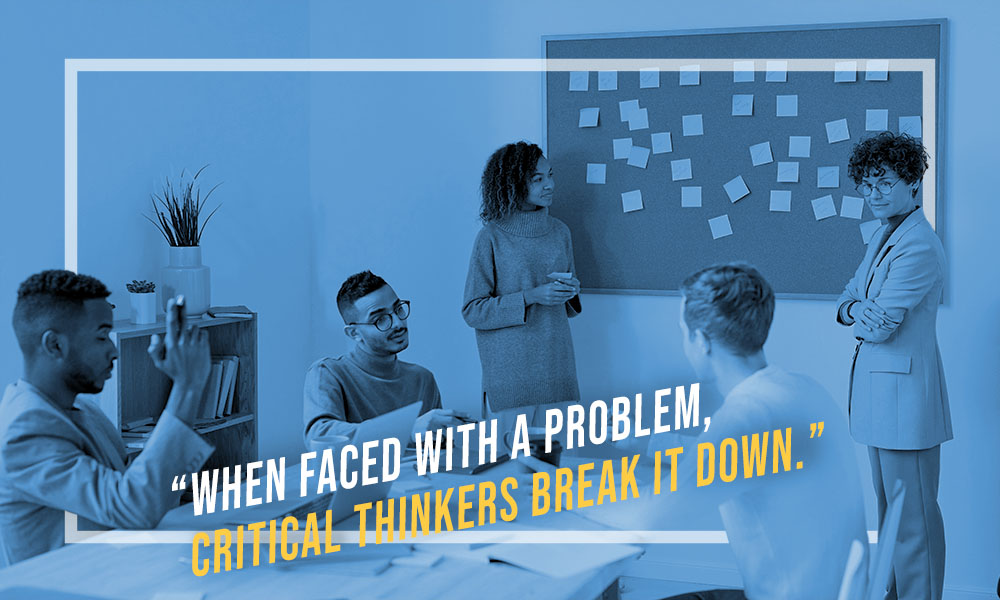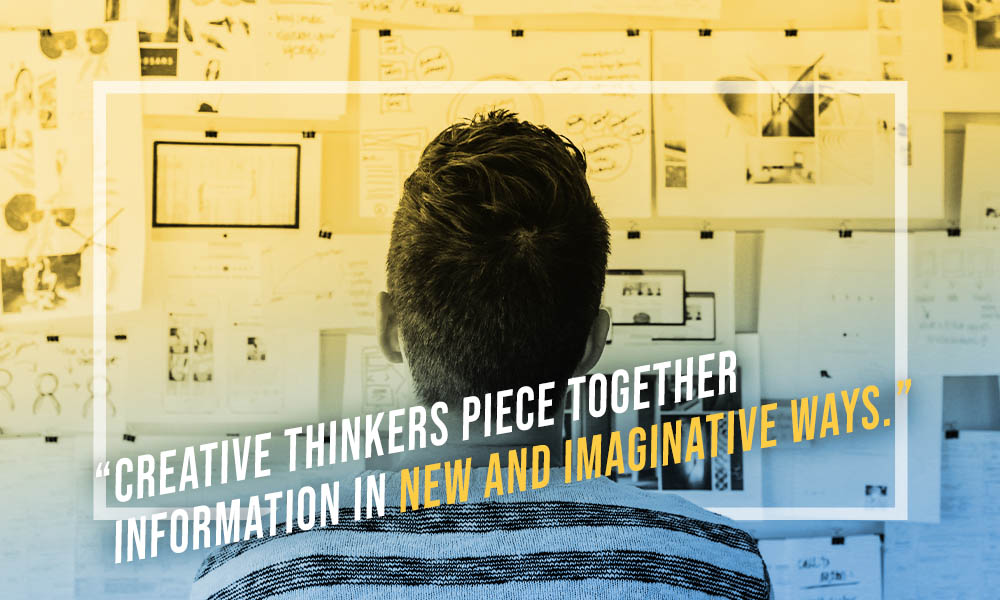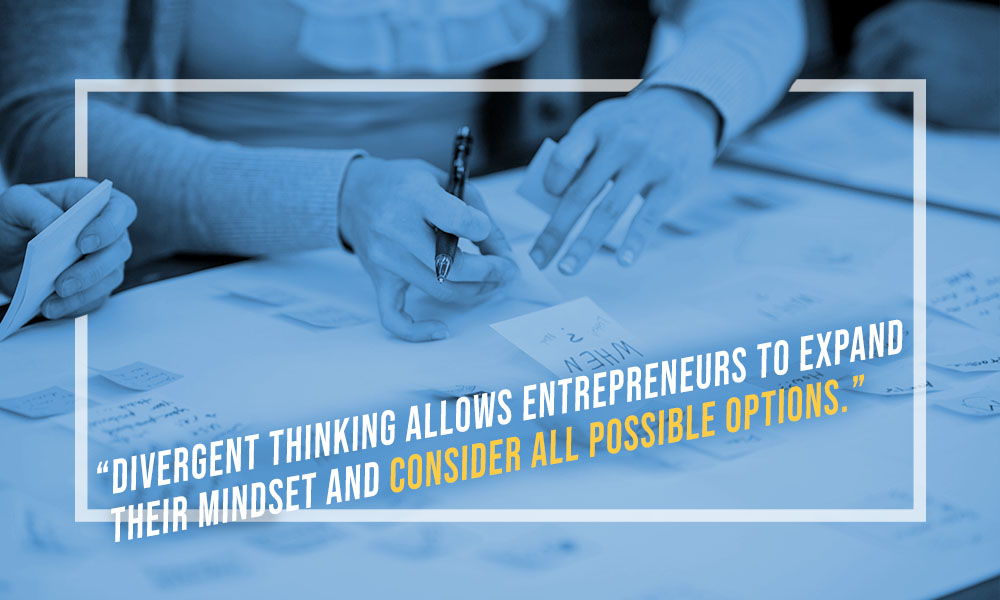If you asked two people with the same exact knowledge and background to brainstorm a solution to the same problem, would both have the same approach?
Probably not.
The way people approach problem solving tends to rely more on their unique thinking processes—not the problem itself. And each different thinking style has its own set of benefits. For example, one could offer an objective point of view, while the other provides an out-of-the-box perspective.
You’re probably set in the thinking skills you’ve adopted over time. And why wouldn’t you be? Your way of thinking has helped you overcome hurdles, set goals and accomplish milestones.
But, it never hurts to check out other types of thinking. After all, the only way to succeed in business and entrepreneurship is to push the boundaries of what you think is possible.
We’ll be diving into the 7 most common types of thinking you can use in business:
- Critical thinking
- Analytical thinking
- Creative thinking
- Abstract thinking
- Concrete thinking
- Convergent thinking
- Divergent thinking
By the end of this blog post, you’ll be able to start tackling your business goals with a fresh perspective and upgraded thinking skills.
7 Types of Thinking to Improve Business and Entrepreneurship
“Thinking” is a super-easy way of referring to how you process information, make decisions and create new ideas. You think when you problem-solve, network and innovate. You think when you teach students, create new courses or pitch to clients.
In other words, there’s rarely a time when entrepreneurs are not thinking.
Thinking often comes so naturally, you hardly realize it’s happening at all! That is, until you stumble across a roadblock that forces you to pay attention and do some reflective thinking (super meta, we know). Fortunately, there are several different ways to think, and you can use each one in your business. Learning how to use each type of thinking can help you confidently approach any issues that come your way.
Let’s dive into the 7 types of thinking!
1. Critical Thinking

Critical thinking is the ability to use careful evaluation or judgment, even in the face of stress. Critical thinkers typically look at the big picture before making any moves. They take time to consider each of their options, and they thoroughly analyze every choice they make—even for something as simple as choosing coffee or tea!
When faced with a problem, critical thinkers break it down. They evaluate and reconstruct all of the information they have about the issue. They find possible solutions by exploring all the factors that may be influencing the problem.
The result of this synthesis is usually a robust plan that accounts for every “What if…” scenario that could possibly happen.
How to Use Critical Thinking to Your Advantage
Learning how to think critically can be your shortcut to developing a ton of high-level business skills. Entrepreneurs who adopt critical thinking processes learn to be independent thinkers. They learn how to cut through the noise to make broad connections, and they fine-tune their methods to simplify their workflow.
Strengthening your critical thinking skills can help with self-reflective skills, observational skills and basic reasoning skills. Plus, you can learn how to better evaluate everything around you, from people to business opportunities.
2. Analytical Thinking
Where critical thinkers look at complex problems as one big picture, analytical thinkers break that big picture down into bite-sized frames. This thought process uses a step-by-step approach to simplify larger issues into small details.
Rather than a holistic view, analytical thinkers prefer to look at a situation as a collection of moving parts. They analyze each part, examining how each element ties into the overall problem or solution. Then, they look at what parts they can change to alter the outcome.
How to Use Analytical Thinking in Business
Analytical thinkers are the type to remain calm in the face of stress. Why? Because instead of rushing to solve a problem, they step back to collect all of the details. And while that thought process might sound time-consuming, you’d be amazed at the actual time analytical thinking can save.
Analytical thinkers consider almost every detail beforehand. They have their materials prepared before jumping into a task or conference call. They consider each element at the start of a project, so they have the resources they need to do it right the first time. You’d be smart to try this thinking style when problem solving.
3. Creative Thinking

Creative thinking is the ability to brainstorm fresh and innovative ideas by ditching established rules, thoughts or theories. If you’re an entrepreneur, you’ve probably used this type of thinking a lot. Creative thinkers piece together information in new and imaginative ways. Instead of the “big picture,” they make their own picture using the information at hand.
The most creative people tend to be creative thinkers, always problem solving in unique ways. If that sounds like you, chances are your thought process has been called “outside the box.”
How Creative Thinking Can Pay Off for Entrepreneurs
As an entrepreneur, you know first-hand that dozens of doors can slam in your face before one opens. To keep a positive mindset, try looking at recurring problems through an alternate lens.
- What haven’t you tried before?
- How would you describe your problem to a child?
- What advice would you give to someone in your shoes?
Creative thinking encourages you to think a bit differently. It helps you to not give up, even when things get tricky. Creativity will also help you find success in failure—with a creative mindset, everything can be used as a launchpad.
4. Abstract Thinking
Abstract thinking is so outside of the box, the box may as well not even exist! At its most basic, abstract thinking is the ability to imagine, predict and make connections to seemingly unrelated things. Abstract thinkers don’t see situations in isolation. Instead, they compare their current situation’s details to past items, events or experiences.
This means that abstract thinkers compare different situations and recognize shared elements. They connect the dots, so to speak, to better understand the hidden meaning between actions and events. It’s common for abstract thinkers to use analogies and metaphors to understand everything—from personal life to business. They find patterns in shared workflow and put themselves in other’s shoes to find solutions.
Use Abstract Thinking to Ramp Up Your Teaching Skills
Whether you’re leading a team or teaching a mastermind course, you should always be on the lookout for ways to improve your teaching skills—and abstract thinking can do just that. Abstract thinking allows you to connect life lessons you’ve experienced to other real-world scenarios.
So, when a client or student is having a difficult moment, you can empathize with their current issue, all while pulling from your own experiences for a solution.
With abstract thinking, you don’t need to be the guru who has all the answers. You don’t have to have lived through every worst-case scenario. You just need to be able to make logical ties between what you have experienced and the situation at hand.
5. Concrete Thinking

Concrete thinking is the exact opposite of abstract thinking. Where abstract thinkers pull from their past experiences, concrete thinkers rely on the cold, hard facts in front of them. They don’t focus on what’s worked in the past, but rather zone in on the here and now. Instead of searching for hidden meaning, concrete thinkers take every situation directly at face value.
But, that’s not to say that concrete thinkers rush to any conclusions. Concrete thinking requires careful evaluation, just like critical thinking. However, instead of digging below the surface, concrete thinking remains on the surface and to-the-point. Concrete thinkers pay attention to the real-world issues before them, making them very upfront problem-solvers.
When to Use (and Avoid) Concrete Thinking in Business
Concrete thinking can be a wonderful tool when you’re dealing with absolutes. Finances, legal work and any other “concrete” fields are better kept specific rather than theoretical. However, in business, there are times when you need to think outside of the box, using more analytical or abstract thinking.
Concrete thinking can be helpful when making direct, upfront decisions. But remember to not get so hung up on one thinking style that your biases prevent you from considering alternatives.
6. Convergent Thinking
Of all the different types of thinking on this list, convergent thinking is the most organized by far. Convergent thinking skills come in handy when there seem to be far too many moving parts to handle. Convergent thinkers know how to logically organize these details into a single solution.
They place the situation’s details into buckets, like Financial Problems, People Problems or Networking Problems. Then, they focus on brainstorming a small number of solutions for each detail. With this thought process, they’re able to mix and match solutions, eliminating a multiple-choice solution and, instead, creating a Frankenstein-esque solution with multiple solutions in one.
How to Use Convergent Thinking Skills in the Real World
Sometimes it can seem like every aspect of business is working against you. You’re on the hunt for new leads, closing sales, dealing with a personal life and more.
When real-world problems start getting hectic, remember to think convergently to realign yourself. Sort the issues at hand into buckets and create solutions for each. Then, find a method that provides the best solution to your problems.
This can take the guesswork out of what to do next and keep you moving on the right path.
7. Divergent Thinking

Where concrete thinking is the polar opposite of abstract thinking, divergent thinking is the polar opposite of convergent thinking. Divergent thinking is the ability to generate as many solutions as possible, with no real order or reason. Rather than trying to find a single answer, divergent thinkers weigh all possible options to drum up several creative ideas.
Divergent thinking starts from the heart of the problem and moves outward to include a variety of aspects. So, if the heart of the problem is a lack of clients, the outward thoughts could include outreach, networking opportunities or advertising opportunities to create a variety of answers. Divergent thinkers tend to bring together facts and data from various sources to brainstorm various solutions.
Why Divergent Thinking is So Important in Business
More often than not, people in business have varying viewpoints. Some will have a completely opposite opinion than you do—but you still need to be able to see their perspective to form a solution that works for everyone.
Divergent thinking allows entrepreneurs to expand their mindset and consider all possible options. Plus, it allows for multiple-choice answers, so there are numerous avenues to explore.
Which Type of Thinking Will You Use Next?
Trying out different types of thinking can open so many new doors for you. Different thought processes allow you to approach complex problems from various angles, providing you with many possible solutions. Don’t let your biases prevent you from trying out different thinking styles—each one is necessary in its own right.
Which thinking skills will you use to your advantage to improve in business and entrepreneurship?






2 Responses